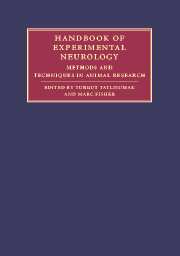Book contents
- Frontmatter
- Contents
- List of contributors
- Part I Principles and general methods
- Part II Experimental models of major neurological diseases
- 18 Focal brain ischemia models in rodents
- 19 Rodent models of global cerebral ischemia
- 20 Rodent models of hemorrhagic stroke
- 21 In vivo models of traumatic brain injury
- 22 Experimental models for the study of CNS tumors
- 23 Experimental models for demyelinating diseases
- 24 Animal models of Parkinson's disease
- 25 Animal models of epilepsy
- 26 Experimental models of hydrocephalus
- 27 Rodent models of experimental bacterial infections in the CNS
- 28 Experimental models of motor neuron disease/amyotrophic lateral sclerosis
- 29 Animal models for sleep disorders
- 30 Experimental models of muscle diseases
- Index
- References
18 - Focal brain ischemia models in rodents
Published online by Cambridge University Press: 04 November 2009
- Frontmatter
- Contents
- List of contributors
- Part I Principles and general methods
- Part II Experimental models of major neurological diseases
- 18 Focal brain ischemia models in rodents
- 19 Rodent models of global cerebral ischemia
- 20 Rodent models of hemorrhagic stroke
- 21 In vivo models of traumatic brain injury
- 22 Experimental models for the study of CNS tumors
- 23 Experimental models for demyelinating diseases
- 24 Animal models of Parkinson's disease
- 25 Animal models of epilepsy
- 26 Experimental models of hydrocephalus
- 27 Rodent models of experimental bacterial infections in the CNS
- 28 Experimental models of motor neuron disease/amyotrophic lateral sclerosis
- 29 Animal models for sleep disorders
- 30 Experimental models of muscle diseases
- Index
- References
Summary
Introduction
Stroke is the second leading cause of mortality worldwide and the third leading cause of death in the United States. Approximately 80% of strokes are ischemic in origin. Stroke ranked as the sixth leading cause of disability-adjusted life years in 1990 and is estimated to rank fourth by the year 2020. Of the stroke survivors about one-half are left with a permanent handicap. It is estimated that 731 000 new strokes per year, 4 000 000 stroke survivors, and 160 000 stroke deaths cost approximately $50 billion (direct and indirect costs) in the USA alone. Given this epidemiological evidence and the magnitude of the problem, it is clear that stroke is a major public health issue and requires urgent effort for developing novel remedies. Experimental focal brain ischemia models serve this purpose.
Experimental focal cerebral ischemia models have been developed with significant effort to mimic closely the changes that occur during and after human stroke. Models help us learn about the pathogenesis of stroke and to define the biochemical changes in tissue during ischemia, thereby discovering mechanisms involved in the evolution of ischemic injury and infarction. This can lead to the development of novel molecules that may reduce the consequences of ischemia and these same animal models can be utilized to test whether these novel molecules have beneficial anti-ischemic effects in vivo.
Information
- Type
- Chapter
- Information
- Handbook of Experimental NeurologyMethods and Techniques in Animal Research, pp. 311 - 328Publisher: Cambridge University PressPrint publication year: 2006
References
Accessibility standard: Unknown
Why this information is here
This section outlines the accessibility features of this content - including support for screen readers, full keyboard navigation and high-contrast display options. This may not be relevant for you.Accessibility Information
- 2
- Cited by
